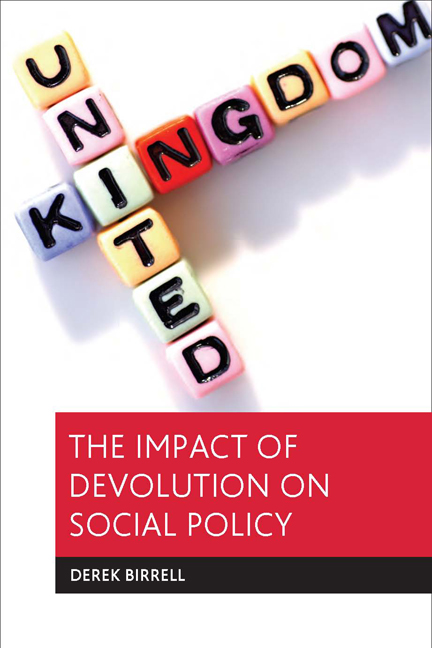Book contents
- Frontmatter
- Dedication
- Contents
- Detailed contents
- List of tables
- List of abbreviations
- Acknowledgements
- one Introduction
- two The salience of social policy in devolved policy, governance and expenditure
- three Innovations, flagship policies and distinctiveness
- four Divergence in social policy
- five Incremental change and low-level differences
- six Convergence in social policy
- seven Interfaces and overlaps
- eight Underpinning values and principles
- nine Comparison of outcomes by country
- ten Conclusion
- References
- Index
nine - Comparison of outcomes by country
Published online by Cambridge University Press: 05 July 2022
- Frontmatter
- Dedication
- Contents
- Detailed contents
- List of tables
- List of abbreviations
- Acknowledgements
- one Introduction
- two The salience of social policy in devolved policy, governance and expenditure
- three Innovations, flagship policies and distinctiveness
- four Divergence in social policy
- five Incremental change and low-level differences
- six Convergence in social policy
- seven Interfaces and overlaps
- eight Underpinning values and principles
- nine Comparison of outcomes by country
- ten Conclusion
- References
- Index
Summary
To what extent has devolution delivered better services, increased provision, greater expenditure, improved well-being and care? Is there statistical data and evidence to back up the rhetoric and claims, and have targets been achieved? Are there any significant differences in performance between the devolved administrations and between the four countries? It is possible to examine available statistical evidence relevant to the achievements of devolution and compare statistics between the different countries. A number of different types of evidence are available based mainly on national statistics analysed on a regional basis, public expenditure data, specific analysis by the devolved administrations and official but independent evaluations by the respective national audit offices. Some research and implementation reports of this data also facilitate an examination of trends over time, including the period since the introduction of devolution. There may be some difficulty with the accuracy of data or differences in quality or definitions in making comparisons, however. For example, Alvarez-Rosete et al (2005) referred to the difficulty and in some cases the impossibility of obtaining valid comparable basic statistics on the NHS in the four countries. With variations in the quality of the data, different definitions and data taken at different times, the view has also been expressed that the serious shortage of good quality comparable data undermines our ability to learn from different policy approaches (Halpern, 2009). The continuing problem with the lack of comparable data on health over time was reiterated by Dixon (2009). Studies by the New Policy Institute and Joseph Rowntree Foundation (2008) of UK differences of poverty also refer to the statistics not being directly comparable and to statistical gaps. It is a complex question of how far this data on differences in outcomes between the four countries can be interpreted as determined in whole or in part to be the direct consequence of devolution. Statistical comparisons can also be valuable in giving some indication of differences in need between the four countries, as well as indicating possible differences in service provision.
Five different types of comparative evidence are examined in this chapter:
• socio-economic and health indicators
• input of public expenditure per head on services
• data on aspects of provision
• assessments by the devolved administrations
• national audit office evaluations of performance
Use is also made of a number of research reports and evaluations that are relevant to comparing provision and performance.
- Type
- Chapter
- Information
- The Impact of Devolution on Social Policy , pp. 159 - 180Publisher: Bristol University PressPrint publication year: 2009



